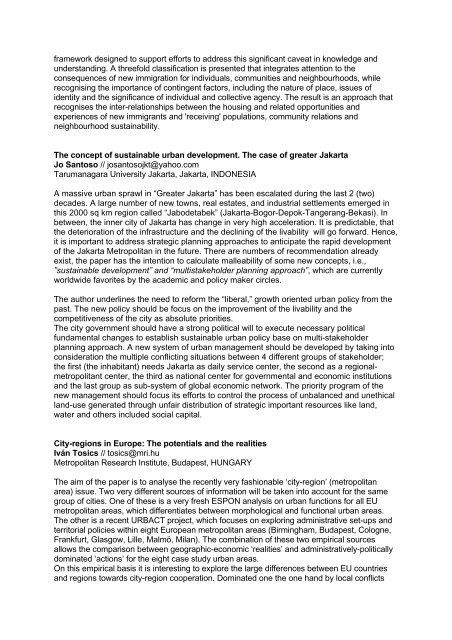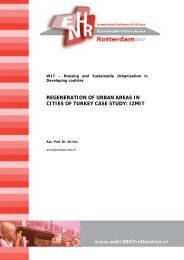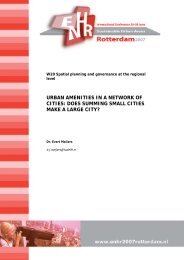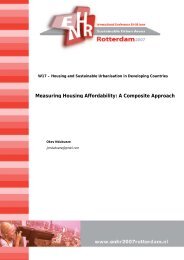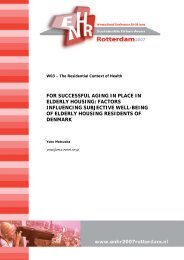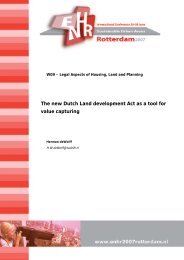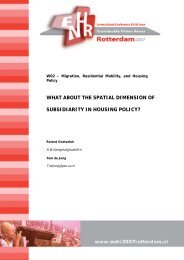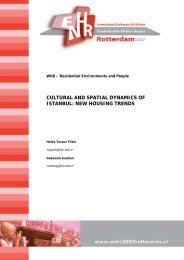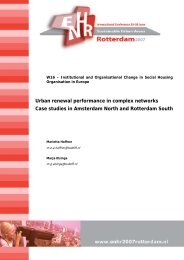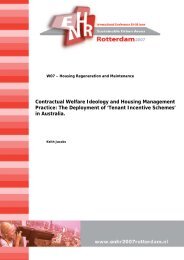Download abstracts - ENHR 2007 Rotterdam
Download abstracts - ENHR 2007 Rotterdam
Download abstracts - ENHR 2007 Rotterdam
You also want an ePaper? Increase the reach of your titles
YUMPU automatically turns print PDFs into web optimized ePapers that Google loves.
framework designed to support efforts to address this significant caveat in knowledge and<br />
understanding. A threefold classification is presented that integrates attention to the<br />
consequences of new immigration for individuals, communities and neighbourhoods, while<br />
recognising the importance of contingent factors, including the nature of place, issues of<br />
identity and the significance of individual and collective agency. The result is an approach that<br />
recognises the inter-relationships between the housing and related opportunities and<br />
experiences of new immigrants and 'receiving' populations, community relations and<br />
neighbourhood sustainability.<br />
The concept of sustainable urban development. The case of greater Jakarta<br />
Jo Santoso // josantosojkt@yahoo.com<br />
Tarumanagara University Jakarta, Jakarta, INDONESIA<br />
A massive urban sprawl in “Greater Jakarta” has been escalated during the last 2 (two)<br />
decades. A large number of new towns, real estates, and industrial settlements emerged in<br />
this 2000 sq km region called “Jabodetabek” (Jakarta-Bogor-Depok-Tangerang-Bekasi). In<br />
between, the inner city of Jakarta has change in very high acceleration. It is predictable, that<br />
the deterioration of the infrastructure and the declining of the livability will go forward. Hence,<br />
it is important to address strategic planning approaches to anticipate the rapid development<br />
of the Jakarta Metropolitan in the future. There are numbers of recommendation already<br />
exist, the paper has the intention to calculate malleability of some new concepts, i.e.,<br />
”sustainable development” and “multistakeholder planning approach”, which are currently<br />
worldwide favorites by the academic and policy maker circles.<br />
The author underlines the need to reform the “liberal,” growth oriented urban policy from the<br />
past. The new policy should be focus on the improvement of the livability and the<br />
competitiveness of the city as absolute priorities.<br />
The city government should have a strong political will to execute necessary political<br />
fundamental changes to establish sustainable urban policy base on multi-stakeholder<br />
planning approach. A new system of urban management should be developed by taking into<br />
consideration the multiple conflicting situations between 4 different groups of stakeholder;<br />
the first (the inhabitant) needs Jakarta as daily service center, the second as a regionalmetropolitant<br />
center, the third as national center for governmental and economic institutions<br />
and the last group as sub-system of global economic network. The priority program of the<br />
new management should focus its efforts to control the process of unbalanced and unethical<br />
land-use generated through unfair distribution of strategic important resources like land,<br />
water and others included social capital.<br />
City-regions in Europe: The potentials and the realities<br />
Iván Tosics // tosics@mri.hu<br />
Metropolitan Research Institute, Budapest, HUNGARY<br />
The aim of the paper is to analyse the recently very fashionable ‘city-region’ (metropolitan<br />
area) issue. Two very different sources of information will be taken into account for the same<br />
group of cities. One of these is a very fresh ESPON analysis on urban functions for all EU<br />
metropolitan areas, which differentiates between morphological and functional urban areas.<br />
The other is a recent URBACT project, which focuses on exploring administrative set-ups and<br />
territorial policies within eight European metropolitan areas (Birmingham, Budapest, Cologne,<br />
Frankfurt, Glasgow, Lille, Malmö, Milan). The combination of these two empirical sources<br />
allows the comparison between geographic-economic ‘realities’ and administratively-politically<br />
dominated ‘actions’ for the eight case study urban areas.<br />
On this empirical basis it is interesting to explore the large differences between EU countries<br />
and regions towards city-region cooperation. Dominated one the one hand by local conflicts


